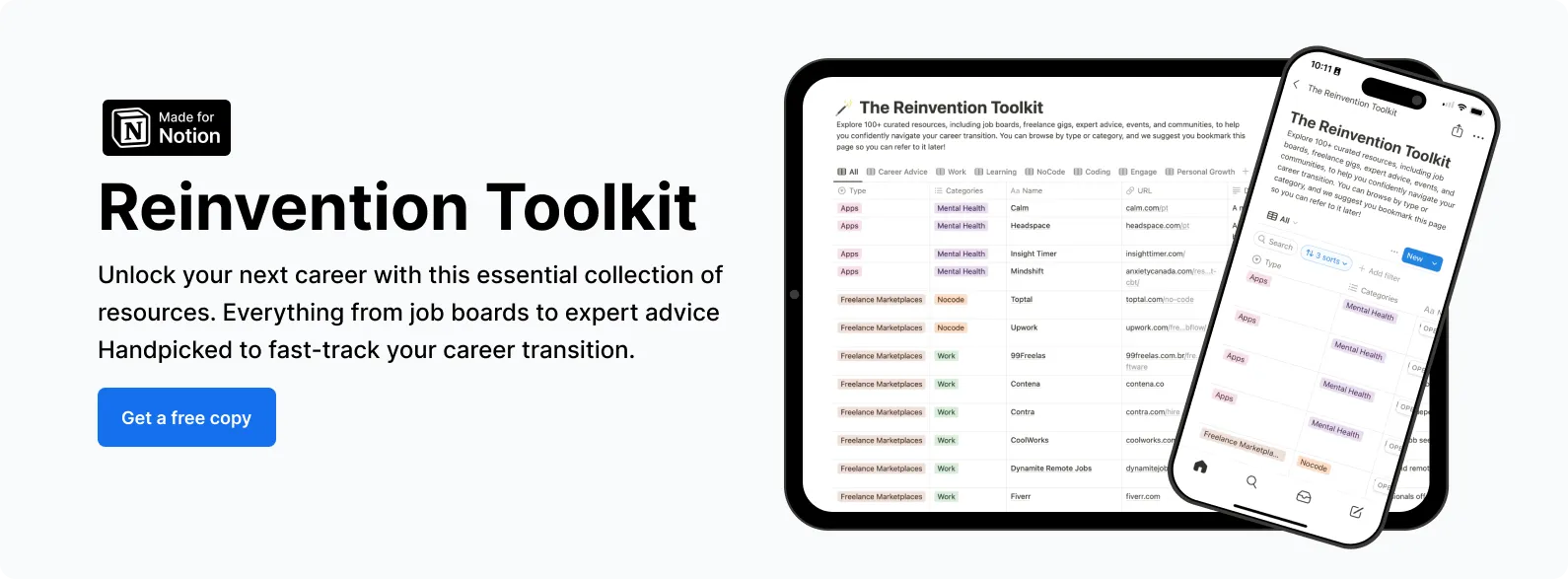Financial Planning for a Career Change
Learn essential strategies for financial planning during a career change. Understand how to budget, save, and manage your finances to ensure a smooth and secure transition.
Table of contents

Learn essential strategies for financial planning during a career change. Understand how to budget, save, and manage your finances to ensure a smooth and secure transition.
Changing careers can be a thrilling journey, but it often comes with financial challenges that can feel overwhelming. According to career change statistics, the average person will change careers 10 to 15 times during their working years. Many people who switch careers experience an initial dip in income, making the transition period stressful and uncertain.

Financial planning for a career change is your best friend when you're considering a career change. It's not just about crunching numbers; it's about creating a safety net that allows you to chase your dreams without the constant worry of financial instability.
Whether you're an office assistant feeling stuck in a monotonous job, a gig worker seeking stability, or a laid-off professional eager to get back into the workforce, careful financial planning can make all the difference.
With the right financial planning, you can confidently navigate this exciting new chapter.
In this article, you'll learn practical tips to manage your finances effectively during a career change, providing you with a sense of relief and helping you achieve stability and success in your new path.
Embarking on a career change can be both exhilarating and nerve-wracking, especially when financial stability is on the line. Let's dive into these essential steps and take control of your financial future!
Thoroughly assessing your financial situation can give you a clear picture of where you stand and what steps you need to take. This helps you move forward with confidence and clarity with your financial planning for a career change.

When Onome Jennifer Jike, a business analyst, decided to change careers and dive into the tech world, she knew the financial strain could be tough.
"Changing careers to work in tech is exciting but can be hard on your money situation. You may not make as much money for a while and have bills you need to sort."
She advises in a LinkedIn post to take a hard look at your current finances. She points outs that this step is crucial because understanding your financial standing helps you plan effectively for the future.
"If you're worried about job security or feeling stuck in a monotonous role, knowing where you stand financially can give you the clarity you need.”
Onome made a detailed list of my monthly expenses, including everything from rent and utilities to groceries and entertainment.
"I found this to be eye-opening, helping me see where my money was going and where I could cut back."
Next, Onome advises that you should evaluate your debt obligations as this is particularly helpful as it highlights the debts that need to be prioritized.
"It's common to fear financial instability during a career change, but being proactive about your debts can alleviate some of that anxiety”
Check your savings and emergency fund. Onome emphasized the importance of having a financial cushion. She advises
"Avoid dipping into your retirement accounts unless absolutely necessary.”
If you're worried about job security or feeling stuck in a monotonous role, assessing your current financial situation is crucial for a smooth career transition.
With NoCode Institute's NoCode Foundations program, you can gain the tech skills you need to change careers confidently and with financial clarity. Learn how to leverage your talents, manage your time, and create additional income streams through passion-driven ventures.
In the blog post of USbank, a blog writer shares their insight on why setting clear goals is necessary when formulating your financial planning for a career change.
By setting clear financial goals, you'll have a structured path to follow, making your career change less daunting and more achievable.

Financial clarity is essential, especially when changing careers, as it helps you focus on what truly matters.
"Your financial goals are an ongoing process that provides clarity and confidence for the future."
The next step is to start by defining your objectives.
"What do you want to achieve with your career change? Whether it's gaining new skills, increasing your earning potential, or finding a more fulfilling job, having specific goals will keep you motivated.”
Create a realistic timeline for your transition. The writer found that setting milestones along her journey made the process less overwhelming.
"Understanding the 'why' helps you become more committed." For example, if you aim to land a tech job in six months, break down the steps needed to reach that point, such as completing a no-code course and updating your resume.”
Lastly, revisit your goals regularly. Life changes, and so should your financial plan. The writer recommends to review your goals at least once a year to adjust expectations.
"This ongoing process ensures you stay aligned with your aspirations, making your career change smoother and more successful.”
Defining your objectives and creating a realistic timeline helps you stay motivated and focused.
NoCode Institute's NoCode programs can help you gain the skills needed for a successful career change, and this article on why upskilling and reskilling matter can provide further insights into planning your transition.
Creating a transition budget is crucial for a career change. Setting aside funds for potential gaps makes the process smoother and helps you achieve your dreams without financial stress.
Derek Pando, a Senior Marketing Manager at LinkedIn, experienced firsthand the peace of mind that comes with financial preparedness.
The safety net of having a transition budget allowed him to remain calm when faced with potential job instability.
"After I finished my MBA, my wife and I made it a priority to have an emergency fund of 6 months of our expenses," he shared.

If you're worried about job security or facing low job satisfaction, this step is especially important. He writes
"First, list out all your essential monthly expenses, such as rent, utilities, groceries, and transportation. Knowing exactly what you need to cover can help you avoid financial stress during your career transition.”
Next, consider any potential income gaps. Derek emphasized,
"Having an emergency fund impacted my career in a positive way by giving me peace of mind."
By creating a transition budget, you can confidently pursue your new career path, knowing you have a financial plan in place. Derek noted,
"I felt very calm, thanks to my financial preparedness.”
If you're facing job insecurity or dissatisfaction, creating a transition budget is crucial to ensure a smooth career change.
You can discover career change ideas at 30 that can help you gain the skills needed to pursue your new career path confidently.
Changing careers is never a straight path, so keep your financial plan flexible. By regularly updating it, you can confidently navigate your career change and achieve your dreams.
Mark Graban, a consultant and author, shared his insights on adapting to unexpected changes in his career. Flexibility is crucial, especially when you're transitioning to a new field like tech. Mark writes,
"You have to be flexible. Don't be disappointed if your plan doesn't play out exactly as you initially thought – go with it.”

Mark advises monitoring your financial plan regularly to help you stay on top of your finances and make necessary adjustments. This approach can help you adapt to changes and stay focused on your goals.
"I've seen my career as a series of rolling five-year plans, and I'm constantly reevaluating and tweaking”
If you're feeling uncertain about the future or worried about financial instability, regularly reviewing your plan can provide reassurance. This proactive approach will help you stay on track and avoid financial stress.
"Make it a habit to check your budget, track your spending, and adjust your goals as needed.”
Mark emphasizes remembering your career change is a journey, and it's okay if things don't go exactly as planned.
"Your career path, whichever twists and turns it might take, only has to make sense to yourself”
If you're uncertain about the future or worried about financial instability, keeping your financial plan flexible is essential.
Regularly updating and monitoring your finances can help you adapt to changes and stay focused on your goals. Insights on career change ideas at 40 can support your journey by providing the skills and guidance needed to achieve your dreams. Find the best platforms to showcase your new skills, connect with employers, and discover exciting career opportunities.
When changing careers, it's crucial to consider your health and insurance needs. This proactive approach helps you focus on your career change without worrying about losing essential coverage.
A blog guide on this topic highlights the importance of planning to avoid gaps in coverage.
"Whether it's moving up the career ladder or switching industries entirely, the average American is likely to change jobs 12 times or more.”
This frequent job change can lead to gaps in employer-sponsored benefits, which can be financially straining, especially if an unexpected medical issue arises.
“Understanding when your current health insurance ends is the first step. Some plans end the day you leave your job, while others cover you until the last day of the month.”
The writer then stresses to think about other benefits such as retirement plans, life insurance, and disability insurance.
“You might need to roll over your 401(k) to a new plan or convert your life insurance policy to an individual plan. Checking with HR can help you understand your options.”
Changing jobs can affect your paid vacation and sick days. Reaching out to HR can help, and this compensation can bridge the gap between old and new benefits, maintaining financial stability during your career transition.
"Reach out to your HR department to see if you will be compensated for all or part of those unused days.”
Understanding when your current health insurance ends and checking options for benefits and compensation can help maintain financial stability. You can pursue high-paying tech jobs with no experience with the right approach. Learn how to leverage mental health resources to overcome career challenges and boost your professional success.
When changing careers, seeking professional financial advice can be a game-changer. A financial advisor can help you create a comprehensive plan, manage unexpected expenses, and provide the emotional support needed to make confident decisions.

Kimberly Beck shares the inspiring story of Donna, a financial planner who turned a personal crisis into a successful career.
"I became a financial advisor just a year or so ago. And I wouldn't trade it for the world. I love what I do. I love helping my clients and their families through life's challenges so that they can succeed – in life and financially.”
After losing her husband, Donna felt overwhelmed by financial decisions. An appointment with her financial planner, Bill, empowered her to make informed choices during this difficult time.
"My financial planner assessed the moving parts, collected needed information, helped me clarify both my short-term and long-term goals, and helped focus my energy on what was essential.”
Donna's experience highlights the importance of having a financial advisor during major life transitions, such as a career change.
"Knowing the financial choices that I made during this time would have long-lasting effects on me and the kids, I needed guidance, and I felt relieved and confident when I had it.”
Recapping the importance of financial planning during a career change, it's clear that assessing your financial situation, setting clear goals, creating a transition budget, and seeking professional advice are crucial steps. These proactive measures help manage uncertainties and ensure a smoother transition.
From understanding your current finances to planning for potential income gaps, each step builds a stronger foundation for your new career. Professional financial advice can provide the guidance and confidence needed during this transition.
By taking these steps, you can navigate your career change with greater financial stability. Start planning today to secure a successful and smooth career transition. NoCode Institute can equip you with the skills and support needed to transition into a tech career, providing a stronger foundation for your new career move.
Ready to transform your career? Join NoCode Institute today and start your journey towards a successful and fulfilling tech career.

Looking to re-invent yourself and turn your talent into a career? Stay up to date with the latest.